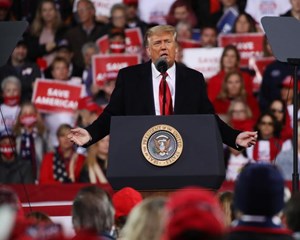The effort had to overcome heightened skepticism in some communities. Many Black voters preferred to exercise their franchise in person or didn't trust the mail. National civil rights groups worked with local organizations to get the word out that this was the best way to ensure one's vote was counted. In Philadelphia, for example, advocates distributed "voting safety kits" containing masks, hand sanitizer and informational brochures. "We had to get the message out that this is safe, reliable, and you can trust it," says Hannah Fried of All Voting Is Local.
這一努力必須克服一些社區日益加深的懷疑。許多黑人選民寧愿親自行使他們的選舉權,也不相信郵件。全國民權組織與地方組織合作,宣傳這是確保一個人的選票被統計的最佳方式。例如,在費城,支持者分發了“投票安全工具包”,包括口罩、洗手液和信息手冊。“我們必須讓人們知道,這是安全、可靠的,你可以信任它,”漢娜·弗里德(Hannah Fried)在談到所有投票都是本地的時說。
At the same time, Democratic lawyers battled a historic tide of pre-election litigation. The pandemic intensified the parties' usual tangling in the courts. But the lawyers noticed something else as well. "The litigation brought by the Trump campaign, of a piece with the broader campaign to sow doubt about mail voting, was making novel claims and using theories no court has ever accepted," says Wendy Weiser, a voting-rights expert at the Brennan Center for Justice at NYU. "They read more like lawsuits designed to send a message rather than achieve a legal outcome."
與此同時,民主黨的律師們在選舉前進行了一場歷史性的訴訟。這種流行病加劇了雙方慣常在法庭上的糾纏。但律師們還注意到了別的事情。紐約大學布倫南司法中心(Brennan Center for Justice)的投票權專家溫迪·威瑟(Wendy Weiser)表示:“特朗普競選團隊提出的訴訟,與更廣泛的競選團隊一起散布對郵件投票的懷疑,提出了新穎的主張,并使用了從未被任何法院接受的理論。”“它們讀起來更像是旨在傳遞信息的訴訟,而不是為了達成法律結果。”

In the end, nearly half the electorate cast ballots by mail in 2020, practically a revolution in how people vote. About a quarter voted early in person. Only a quarter of voters cast their ballots the traditional way: in person on Election Day.
最終,在2020年,將近一半的選民通過郵件投票,這實際上是一場人們投票方式的革命。大約四分之一的人親自提前投票。只有四分之一的選民以傳統的方式投票:在選舉日親自投票。
Bad actors spreading false information is nothing new. For decades, campaigns have grappled with everything from anonymous calls claiming the election has been rescheduled to fliers spreading nasty smears about candidates' families. But Trump's lies and conspiracy theories, the viral force of social media and the involvement of foreign meddlers made disinformation a broader, deeper threat to the 2020 vote.
壞人傳播虛假信息并不是什么新鮮事。幾十年來,競選團隊一直在努力應對各種各樣的問題,從聲稱選舉已被重新安排的匿名電話,到散布對候選人家庭的骯臟誹謗的傳單。但特朗普的謊言和陰謀論、社交媒體的病毒式傳播以及外國干預者的介入,讓虛假信息成為了對2020年大選更廣泛、更深層次的威脅。
Laura Quinn, a veteran progressive operative who co-founded Catalist, began studying this problem a few years ago. She piloted a nameless, secret project, which she has never before publicly discussed, that tracked disinformation online and tried to figure out how to combat it. One component was tracking dangerous lies that might otherwise spread unnoticed. Researchers then provided information to campaigners or the media to track down the sources and expose them.
勞拉·奎因(Laura Quinn)是一位經驗豐富的進步派特工,也是Catalist的聯合創始人,她在幾年前開始研究這個問題。她開展了一個匿名的秘密項目,在網上追蹤虛假信息,并試圖找出應對之策。她之前從未公開討論過這個項目。其中一個部分是追蹤危險的謊言,否則這些謊言可能會在不被注意的情況下傳播。然后,研究人員向活動人士或媒體提供信息,以追蹤并曝光這些信息的來源。
譯文由可可原創,僅供學習交流使用,未經許可請勿轉載。











